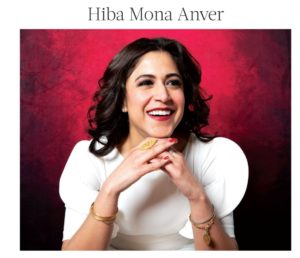
As the first woman, person of color, and first-generation American to lead an internal legal team at Arlington’s Erickson Immigration Group, Anver’s practice focuses on the employment-based nonimmigrant visa and green card process and I-9 compliance. Anver, a partner and shareholder, fights for her clients because she says she understands the challenges they face. After all, her own parents had emigrated from Pakistan.
“When you come from an immigrant or minority background, you learn a tremendous work ethic as a result of seeing your parents establishing themselves, and you learn to empathize on a much higher level,” she says.
At a firm with 220 employees, Anver leads an international team of more than 50 people located in four countries — the U.S., Ireland, Mexico and Singapore — that manages clients in various industries, including tech, social media, e-sports, fintech, e-commerce, retail, medicine, investment and education. The firm, which runs an “Immigration Nerds” podcast, also sees Anver perform a fair amount of pro bono work.
Being heard and being taken seriously as a woman of color wasn’t always easy for Anver. “When I first started my career, I looked younger for my age, and I think that was a dead giveaway to opposing counsel that I was a new attorney,” she says.
When she worked as an attorney in Fort Worth, the bailiff once asked to see her bar card because he thought she was a paralegal picking up a client. Another time, she was mediating a divorce case, and the opposing attorney commented that he had ties older than Anver.
In retrospect, Anver wishes she had spoken up. “I assumed at that time there was nothing I could do about it,” she says. “I realized after the fact that I didn’t have to put up with this stuff. My goal is to provide women with the opportunity for conversations that helps them realize sooner what’s happening and that it’s not OK and you don’t have to put up with it.”
What do most Americans misunderstand about immigration? Immigrants aren’t taking U.S. jobs. The reason U.S. companies seek foreign talent is they’re looking to fill an open position with the right talent, with the right skillset. If there were a U.S. candidate to fill that position, they would be hired, instead of going through the lengthy and complicated immigration process.
Tell me more about your “Immigration Nerds” podcast: We imagined a solution that allowed people to access the information according to their schedule, and the content is in concise bite-sized episodes. We wanted to create an opportunity to talk about immigration but not be limited to the type of immigration law we practice. We sometimes feature immigrants themselves.
Who do you turn to for advice? There are people I talk with who help me hash out certain issues or verbally process certain issues but I don’t really turn to anyone for professional advice very often. But for life advice, it’s my mother, hands down.
Your proudest achievement: My law degree. What I found is that education is a great equalizer. Not being the most financially well-off growing up, I felt less than. And then all of a sudden, I got this education. My ethnic makeup didn’t change, my family situation didn’t change, but I was an educated woman, and I was no longer intimidated by anyone in a room.
What do you do to recharge on the weekends? Netflix. “Peaky Blinders” might be my all-time favorite show. Also “Ozark” and “Succession” — that’s my top three. I feel like I have to be mentally responsible for a lot of things during the week, so I like to use my weekends to disconnect and do as little as possible.
What’s something most people don’t know about you? I am a little bit of an adrenaline junkie and thrill seeker. I’m really into hiking and diving, and for some reason, that tends to surprise people, especially whenever I mention something about one of my extreme vacations.
